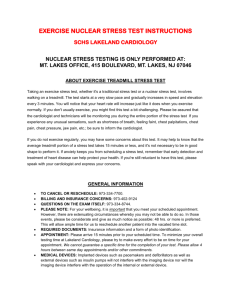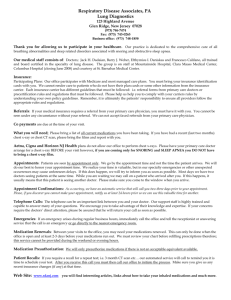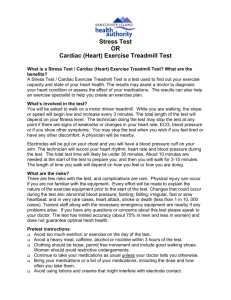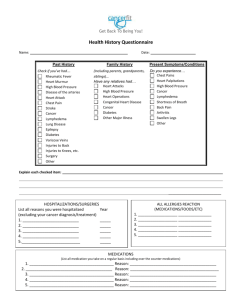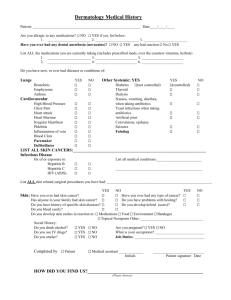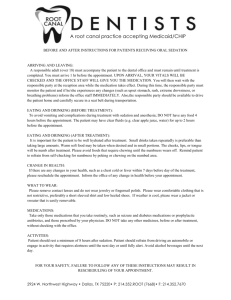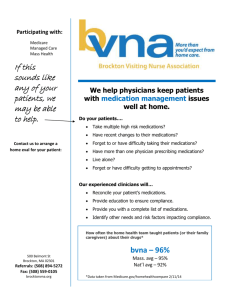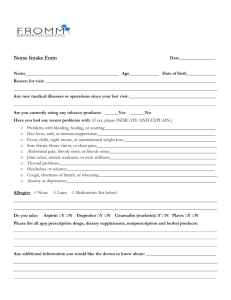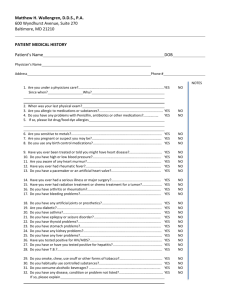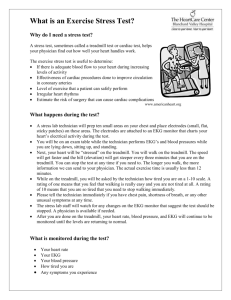Lexiscan (Chemical) Stress Test Information
advertisement
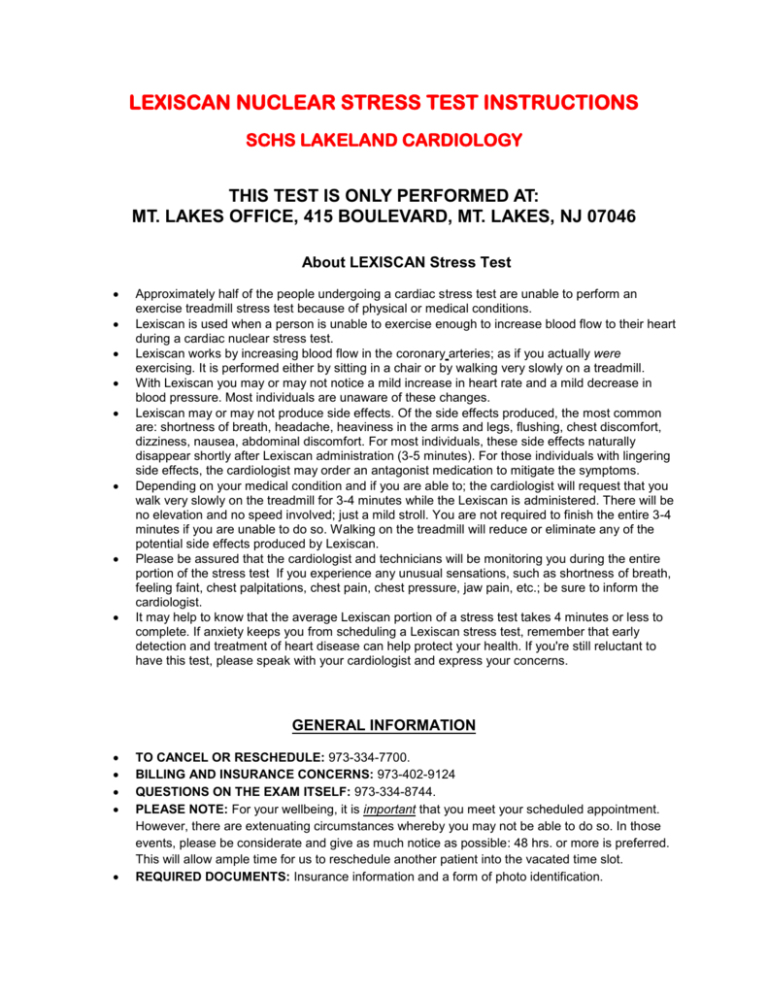
LEXISCAN NUCLEAR STRESS TEST INSTRUCTIONS SCHS LAKELAND CARDIOLOGY THIS TEST IS ONLY PERFORMED AT: MT. LAKES OFFICE, 415 BOULEVARD, MT. LAKES, NJ 07046 About LEXISCAN Stress Test Approximately half of the people undergoing a cardiac stress test are unable to perform an exercise treadmill stress test because of physical or medical conditions. Lexiscan is used when a person is unable to exercise enough to increase blood flow to their heart during a cardiac nuclear stress test. Lexiscan works by increasing blood flow in the coronary arteries; as if you actually were exercising. It is performed either by sitting in a chair or by walking very slowly on a treadmill. With Lexiscan you may or may not notice a mild increase in heart rate and a mild decrease in blood pressure. Most individuals are unaware of these changes. Lexiscan may or may not produce side effects. Of the side effects produced, the most common are: shortness of breath, headache, heaviness in the arms and legs, flushing, chest discomfort, dizziness, nausea, abdominal discomfort. For most individuals, these side effects naturally disappear shortly after Lexiscan administration (3-5 minutes). For those individuals with lingering side effects, the cardiologist may order an antagonist medication to mitigate the symptoms. Depending on your medical condition and if you are able to; the cardiologist will request that you walk very slowly on the treadmill for 3-4 minutes while the Lexiscan is administered. There will be no elevation and no speed involved; just a mild stroll. You are not required to finish the entire 3-4 minutes if you are unable to do so. Walking on the treadmill will reduce or eliminate any of the potential side effects produced by Lexiscan. Please be assured that the cardiologist and technicians will be monitoring you during the entire portion of the stress test If you experience any unusual sensations, such as shortness of breath, feeling faint, chest palpitations, chest pain, chest pressure, jaw pain, etc.; be sure to inform the cardiologist. It may help to know that the average Lexiscan portion of a stress test takes 4 minutes or less to complete. If anxiety keeps you from scheduling a Lexiscan stress test, remember that early detection and treatment of heart disease can help protect your health. If you're still reluctant to have this test, please speak with your cardiologist and express your concerns. GENERAL INFORMATION TO CANCEL OR RESCHEDULE: 973-334-7700. BILLING AND INSURANCE CONCERNS: 973-402-9124 QUESTIONS ON THE EXAM ITSELF: 973-334-8744. PLEASE NOTE: For your wellbeing, it is important that you meet your scheduled appointment. However, there are extenuating circumstances whereby you may not be able to do so. In those events, please be considerate and give as much notice as possible: 48 hrs. or more is preferred. This will allow ample time for us to reschedule another patient into the vacated time slot. REQUIRED DOCUMENTS: Insurance information and a form of photo identification. APPOINTMENT: Please arrive 15 minutes prior to your scheduled time. To minimize your overall testing time at Lakeland Cardiology, please try to make every effort to be on time for your appointment. We cannot guarantee a specific time for the completion of your test. Allow at least 4 hours time between same day appointments and/or other commitments. MEDICAL DEVICES: Implanted devices such as pacemakers and defibrillators as well as external devices such as insulin pumps will not interfere with the imaging device nor will the imaging device interfere with the operation of the internal or external device. PLEASE READ FOLLOWING INSTRUCTIONS CAREFULLY 12 hours prior to you appointment: No coffee, tea (including decaffeinated)) or caffeinated products such as soda, chocolate, cold & allergy medications or any product that might contain caffeine. (If unsure, check product ingredients. If still unsure, do not eat or drink the product) 2 Hours prior to you appointment: No food or beverages with the exception of water. You may drink as much water as desired. Diabetics (Insulin or oral medication dependent): We want to remind you that you should anticipate a period of not eating and therefore consider necessary adjustments to your scheduled food intake and/or insulin adjustments based on your individual management plan. If you are unsure, please be sure to ask your physician or nurse Asthmatics: Make sure to bring along your inhaler. Medications: Bring a complete copy of all your current medications. Skin Preparation: Shower or bathe prior to appointment to ensure removal of naturally occurring skin oils. Do not apply any skin lotions, perfume, powder or after shave. Safety: For your safety and comfort, wear flat walking shoes or sneakers Clothing: Wear loose fitting comfortable clothes; make sure sleeves slide easily above elbow. Shirts and blouses etc., should not have metal buttons. Jewelry: No jewelry should be worn on the chest area. I.e. pins, necklaces, piercings, medals, religious pins attached to bra, etc. No metal buttons on shirts or blouses. Medications: You may continue to take all your prescribed medications with the exception of medications containing theophylline or dipyridamole. Common Prescription Medications containing Theophylline Common Prescription Medications containing Dipyridamole Slo-Phylline Theolair Elixophylin Aerolate Slobid Theo-24 Theo-Dur Uni-Dur Uniphil Oxtriphylline (Choledyl) Aminophylline Dyphylline (Dilor, Lufylin) Pentoxifylline (Trental) Aggrenox Persantine
